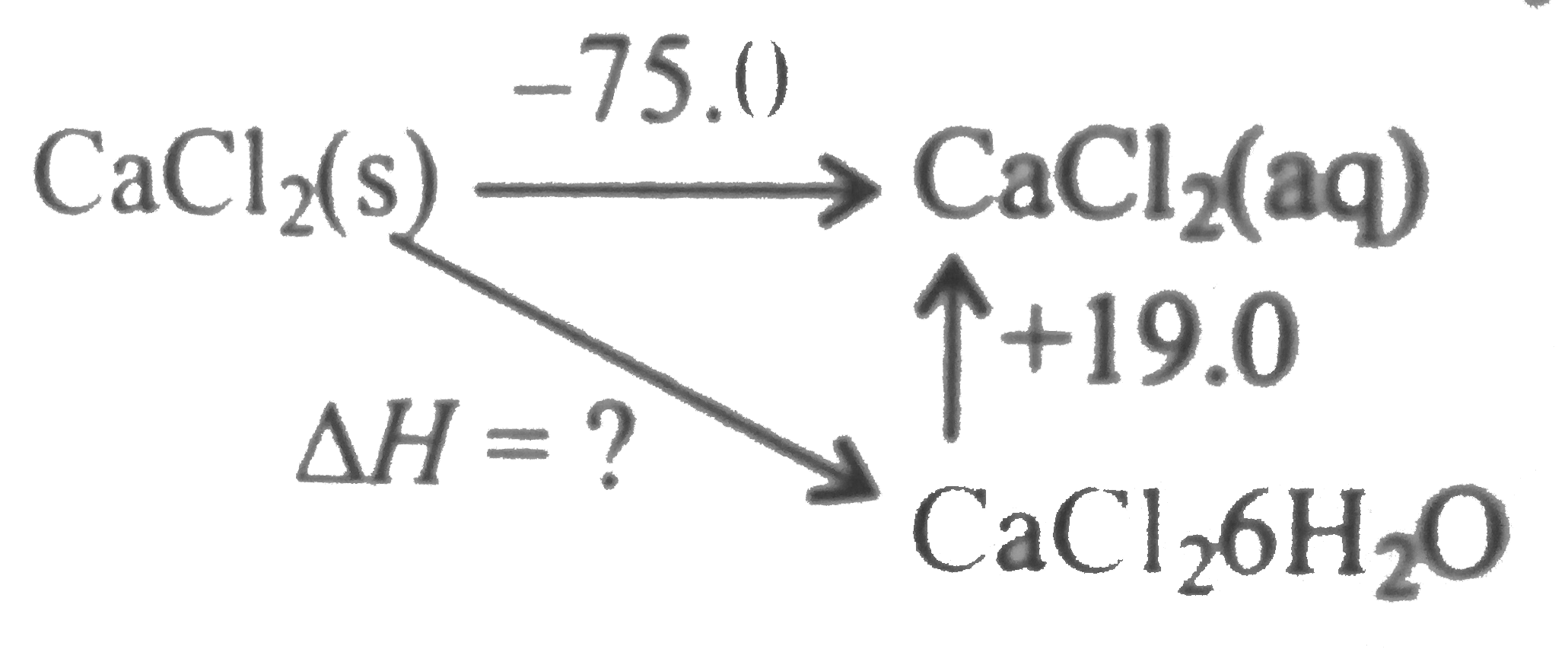Given CaCI2(s)+aq→CaCI2(aq):ΔHΘ=75kJmol−1 at 18∘C and CaCI2.6H2O+aq→CaCI2(aq),ΔHΘ19kJmol−1 at 18∘C. Find the heat of hydration of CaCI2 to CaCI2.6H2O by H2O(g). The Heat of vaporisation of water may be taken as 2452J−1gat18∘C.

⇒−75=ΔH+19ΔH=−75−19=−94kJmol−1
In the question, ΔhydH from H2O(g) is to be calculated, whereas ΔcalH above is from H2O(l).
ΔvapH=2452Jg−1=2452×18Jmol−1
=6×2452×18Jmol−1
=6×2452×18103kJmol−1
=264.816
ΔHactual=−94−(264.816)=−358.816kJmole−1
Topper's Solved these Questions
- THERMODYNAMICSBook:CENGAGE CHEMISTRYChapter:THERMODYNAMICSExercise:Ex 6.4
Explore 16 Videos
- THERMODYNAMICSBook:CENGAGE CHEMISTRYChapter:THERMODYNAMICSExercise:Ex 6.5
Explore 30 Videos
- THERMODYNAMICSBook:CENGAGE CHEMISTRYChapter:THERMODYNAMICSExercise:Ex 6.2
Explore 27 Videos
- STOICHIOMETRYBook:CENGAGE CHEMISTRYChapter:STOICHIOMETRYExercise:Archives Subjective
Explore 33 Videos
Similar Questions
Given:
NaCI(s)+aq→Na⊕(aq)+CIΘΔH=3.9kJ
Na⊕(g)+CIΘ(g)→NaCI(s)ΔH=−788kJ
CIΘ(g)+aq→CIΘ(aq)ΔH=−394.1kJ
Calculate the enthalpy of hydration of Na⊕ ions.
View SolutionCalculate the resonance enegry of toulene (use Kekule structure form the following data
C7H8(l)+9O2(g)→7CO2(g)+4H2O(l)+ΔH,ΔHΘ=−3910kJmol−1
C7H8(l)→C7H8(g),ΔHΘ=38.1kJmol−1
ΔfHΘ(water)=−285.8kJmol−1
ΔfHΘ[CO2(g)]=−393.5kJmol−1
Heat of atomisaiton of H2(g)=436.0kJmol−1
Heat of sulimation of C(g)=715.0kJmol−1
Bond energies of C−H,C−C, and C=C are 413.0,345.6, and 610.0kJmol−1.
View Solution
Knowledge Check
If the heats of formation of C2H2 and C6H6 are 230kJmol−1 and 85kJmol−1 respectively, the ΔH value for the trimerisation of C2H2 is
A−605kJB−205kJC205kJD605kJGiven that ,
H2O(l)→H+(aq)+OH−(aq),ΔH=57.32kJ
H2(g)+12O2(g)→H2O(l),ΔH=−286.02kJ
Then calculate the enthalpy of formation of OH− at 25∘CA−22.8kjB−343.52kJC+228.8kJD+343.52kJ
Given that :
O(g)+e−→O−(g)ΔH=−142kJmol−1
O(g)+2e−→O2−(g)ΔH=+712kJmol−1
what will be the ΔH for the reaction:
O−(g)+e−→O2−(g)
View SolutionCalculate the enthalpy of formation of ΔfH for C2H5OH from tabulated data and its heat of combustion as represented by the following equaitons:
i. H2(g)+12O2(g)→H2O(g),ΔHΘ=−241.8kJmol−1
ii. C(s)+O2(g)→CO2(g),ΔHΘ=−393.5kJmol−1
iii. C2H5OH(l)+3O2(g)→3H2O(g)+2CO2(g),ΔHΘ=−1234.7kJmol−1
a. −2747.1kJmol−1 b. −277.7kJmol−1
c. 277.7kJmol−1 d. 2747.1kJmol−1
View SolutionH2O(g)→H2O(l),ΔH=−40.7kJ
ΔH is the heat of……………….of water.
View SolutionH2O(l)→H2O(g),ΔH=+40.7kJ
ΔH is the heat of ……………..of water.
View SolutionH2O(s)→H2O(l),ΔH=6.01kJ
ΔH is the heat of …………………of ice.
View SolutionThe enthalpy of formation of hypothetical CaCl(s) is found to be - 180 kJ mol−1 and that of CaCI2 (s) is -800 kJ mol−1. Calculate ΔfH∘ for the disproportionation reaction:
2CaCI(s)→CaCI2(s)+Ca(s)
View Solution